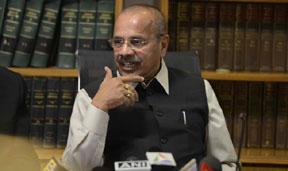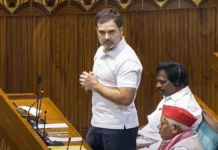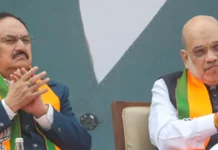 NEW DELHI: Appointment of judges is not an integral part of independence of judiciary, asserts Law Minister D V Sadananda Gowda, who also dismisses fears that the National Judicial Appointments Commission is tilted in favor of the executive.
NEW DELHI: Appointment of judges is not an integral part of independence of judiciary, asserts Law Minister D V Sadananda Gowda, who also dismisses fears that the National Judicial Appointments Commission is tilted in favor of the executive.
He also asserts that the primacy of the judiciary will always be there in the appointments, notwithstanding the fact that the collegium will not exist.
“The appointment of judges is not an integral part of independence of the judiciary. The appointment of judges is an executive function because the orders will be issued by an executive order.
“It passes through the various stages and goes to the Prime Minister. Finally the President will act. So, it will not be a judicial order, it will be an executive function,” he told PTI in an interview.
Gowda’s remarks come in the midst of a hearing in the Supreme Court on the validity of the NJAC Act in which the Centre has attacked the collegium system of judges appointing judges saying that it did not follow the principle of meritocracy in which many “undeserving” persons became judges.
Gowda also responded to a question on fears that the end of the over two decade-long collegium system would mean an end of the judiciary’s supremacy in appointing judges. (More) PTI NAB
“Taking (away) the primacy of judiciary…that does not arise. Apart from that, I want to make it very clear that the constitution of the NJAC is made in such a way that the responsibility of the Executive is very little. Only one member of the government (the Law Minister) is there.
“The primacy of the judiciary is kept, because it is presided over by the Chief Justice of India and two senior judges of the Supreme Court are the members. Two eminent persons will be selected by the PM, the Leader of the Opposition (in the Lok Sabha) and the CJI,” Gowda said.
Under the collegium system, the CJI, along with four other senior judges of the Supreme Court, used to recommend names of judges for the apex court and 24 High Courts.
Government was free to return their recommendation only once for reconsideration.
Responding to suggestions that the two eminent persons on the Commission could ’tilt’ the decisions in favor of the government, the Law Minister said the PM, CJI and Leader of the Opposition who nominate the two eminent persons to the Commission “are from three (different) corners”.
“In democracy, at no point of time, the Opposition and ruling party have gone together, nowhere in the history.
Judiciary can’t say that the opposition leader and PM will join hands. It is highly impossible on this earth.
“So, selection of two eminent personalities is also done in such a way, it is very transparent and it cannot be biased or it cannot be single-sided action. The CJI presides over the commission and veto powers are there. So nobody can say that,” he said. (More) PTI NAB
Responding to the people who come in the criteria of being ’eminent persons’, he said at the meeting of the selection committee, everybody can suggest the norms on who can be the eminent person.
“The criteria and other things, credentials can also be discussed in the committee. It is quite transparent just like debate in Parliament,” he said.
He also expressed concern at the over 350 vacancies in 24 high courts. The rise in vacancies is also due to the fact that government had recently enhanced the strength in HCs by 25 per cent.
“But we thought that NJAC, as soon as it is formed, vacancies will be cleared immediately. But as the NJAC Act is under judicial scrutiny, a little delay is there. I do concede. But we requested the Supreme Court for extension of period of some additional judges. They have extended their tenure for three months.
“The vacancies have to be filled up. These include the enhanced strength of 25 per cent. The vacancies will continue till the case is settled. Certainly. Unless the Supreme Court gives its judgment, we are not in a position to go ahead,” he said.–PTI





